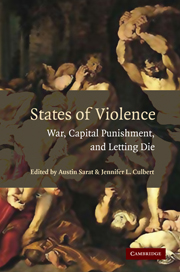Book contents
- Frontmatter
- Contents
- Contributors
- Acknowledgments
- 1 Introduction: Interpreting the Violent State
- PART I ON THE FORMS OF STATE KILLING
- 2 The Innocuousness of State Lethality in an Age of National Security
- 3 Oedipal Sovereignty and the War in Iraq
- 4 Sacrifice and Sovereignty
- 5 Due Process and Lethal Confinement
- 6 From Time to Torture: The Hellish Future of the Criminal Sentence
- 7 The Child in the Broom Closet: States of Killing and Letting Die
- 8 The Lethality of the Canadian State's (Re)cognition of Indigenous Peoples
- PART II INVESTIGATING THE DISCOURSES OF DEATH
- Index
- References
2 - The Innocuousness of State Lethality in an Age of National Security
Published online by Cambridge University Press: 11 September 2009
- Frontmatter
- Contents
- Contributors
- Acknowledgments
- 1 Introduction: Interpreting the Violent State
- PART I ON THE FORMS OF STATE KILLING
- 2 The Innocuousness of State Lethality in an Age of National Security
- 3 Oedipal Sovereignty and the War in Iraq
- 4 Sacrifice and Sovereignty
- 5 Due Process and Lethal Confinement
- 6 From Time to Torture: The Hellish Future of the Criminal Sentence
- 7 The Child in the Broom Closet: States of Killing and Letting Die
- 8 The Lethality of the Canadian State's (Re)cognition of Indigenous Peoples
- PART II INVESTIGATING THE DISCOURSES OF DEATH
- Index
- References
Summary
What is required is thus a sovereignty, a force that is stronger than all the other forces in the world. But if the constitution of this force is, in principle, supposed to represent and protect this world democracy, it in fact betrays and threatens it from the very outset, in an autoimmune fashion, and in a way that is … just as silent as it is unavowable. Silent and unavowable like sovereignty itself.
– Jacques Derrida, RoguesAll states are lethal by definition. Max Weber knew this, and in a 1918 speech to law students in Germany, “Politics as a Vocation,” he detailed this recognition by way of a definition. Assuring his audience that his lecture would disappoint them, he first announced that politics should be understood as the leadership of a political association, “hence today, of a state.” Hewing firmly to a sociological point of view, he eliminated the consideration of ends or goals in his definition of a state, because different states historically have had different ends. What defines a state for Weber is its means, and the means specific to all states is the use of physical force. Weber approvingly quotes Leon Trotsky to introduce this sociological definition of the state: “‘Every state is founded on force,’ said Trotsky at Brest-Litovsk. That is indeed right” (78). Weber then provides two quick definitions of the state. The first defines the state as “a human community that (successfully) claims the monopoly of the legitimate use of physical force within a given territory” (78).
- Type
- Chapter
- Information
- States of ViolenceWar, Capital Punishment, and Letting Die, pp. 25 - 50Publisher: Cambridge University PressPrint publication year: 2009
References
- 1
- Cited by

